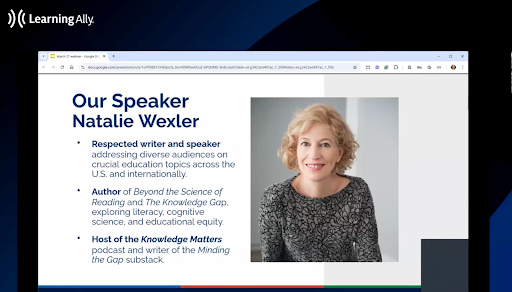
In today’s rapidly evolving educational landscape, literacy remains a cornerstone for student success. Yet, despite improvements in phonics instruction and foundational reading skills, many students, particularly at higher grade levels, continue to struggle with complex texts. Natalie Wexler, an esteemed expert in literacy education, recently led a comprehensive webinar in partnership with Learning Ally, outlining strategies for educators and school leaders to help struggling readers access complex texts. This blog post distills key insights from that discussion, providing actionable strategies to empower your students and enhance literacy outcomes.
Understanding the Literacy Challenge
The National Assessment of Educational Progress reveals a concerning statistic: as of 2024, only 30% of eighth graders are proficient readers. This gap in literacy skills is further highlighted by reports of incoming high school freshmen reading at or below third-grade levels. According to Wexler, this issue persists because many educators focus on early phonics instruction, overlooking older students who require support in overcoming additional challenges such as fluency, background knowledge, and complex syntax.
The Role of Background Knowledge and Complex Syntax
Background knowledge and syntax complexity are critical components in reading comprehension. Wexler illustrates this with an example from a British newspaper article on cricket, highlighting how lack of familiarity with the subject matter can impede understanding. Similarly, complex sentence structures, such as appositives, often confuse students who are more accustomed to conversational language.
Building Fluency in Struggling Readers
To address these challenges, it is vital for educators to incorporate fluency-building activities into their curriculums. Techniques such as repeated oral readings, choral reading, echo reading, and reader’s theater engage students with grade-level texts, enhancing their ability to comprehend complex materials. It is crucial to practice these skills with engaging and meaningful content that encourages students to draw upon prior learning.
Leveraging Oral Language for Literacy Development
Wexler emphasizes the power of oral language in literacy instruction. Listening comprehension often surpasses reading comprehension until students become proficient readers, making it an ideal starting point for building knowledge. Educators can utilize read-alouds and class discussions to introduce new information and vocabulary in a digestible format, facilitating transfer to long-term memory.
Integrating Reading and Writing
Writing about content significantly boosts comprehension and retention. By connecting reading and writing, educators can reinforce students’ understanding of complex texts. Wexler advises starting sentence-level writing instruction, embedding activities within the curriculum, and using oral language as a stepping stone to writing tasks. These practices enable students to articulate their learning and solidify new concepts.
Harnessing the Power of Audiobooks
Audiobooks are a versatile tool that can help struggling readers follow along with complex texts, lifting the cognitive burden of decoding. Wexler recommends using audiobooks as a bridge to independent reading, allowing students to engage with content above their current reading level. By following along in the text, students improve their fluency and comprehension skills.
Empowering Educators with Effective Strategies
Teachers are constantly balancing the demands of a busy classroom schedule. Wexler suggests incorporating oral language activities like repeated readings and discussions into regular content areas to create a more literate environment. Additionally, using creative methods like poetry memorization or reader’s theater can make learning engaging and enjoyable for students.
Empowering all students to become proficient readers requires a multifaceted approach that includes phonics, fluency, background knowledge, and syntax instruction. By integrating oral language, audiobooks, and connected reading and writing activities into your literacy curriculum, you can unlock the potential of struggling readers and provide them with the tools they need to succeed. For educators and school leaders, implementing these strategies will not only enhance literacy outcomes but also foster a lifelong love of reading in students.

Watch literacy expert Natalie Wexler in this on-demand webinar to discover how the power of oral language—including engaging read-alouds, rich class discussions, strategic use of audiobooks, and targeted oral activities—can unlock complex texts for all learners.
Learn practical tips for:
• building essential background knowledge;
• expanding vocabulary; and
• fostering deep syntactic understanding.
To further explore these strategies, consider the insights and research discussed in Natalie Wexler’s book, “Beyond the Science of Reading.” Learn more about audiobooks and tools to support struggling readers and join us on the journey to unlock literacy and empower the next generation of learners.